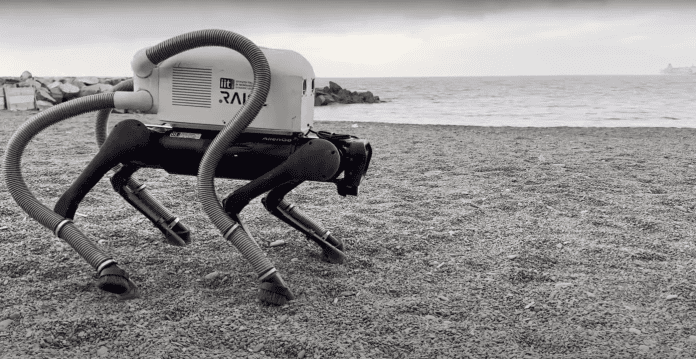This post is also available in:
 עברית (Hebrew)
עברית (Hebrew)
Researchers at the Italian Institute of Technology (IIT) in Genoa have developed VERO (Vacuum-cleaner-equipped RObot), a specialized autonomous robot designed to remove waste, particularly cigarette butts, from environments that are more challenging to clean (like beaches or narrow alleys). Unlike traditional wheeled or tracked robots, VERO uses four legs with custom 3D-printed nozzles on hoses that connect to a central vacuum system. This setup allows the robot to maintain ground-level suction without impeding its movement.
Litter, particularly cigarette butts, poses a significant ecological threat as it migrates from urban areas to water bodies, releasing toxic chemicals and microplastics as it decomposes. Current manual collection methods are limited in efficiency. VERO aims to address this by autonomously navigating diverse terrains inaccessible to conventional robots.
Built on the AlienGo platform by Unitree, VERO integrates a commercial vacuum on its back with 3D-printed nozzles on hoses going down its legs, and employs advanced technologies such as a convolutional neural network for litter detection and a planner for optimal collection strategies. A visual-servoing system guides the vacuum nozzle, ensuring precise targeting of identified debris while the robot remains mobile.
According to Interesting Engineering, initial tests across various outdoor settings demonstrated VERO’s effectiveness, achieving nearly 90% collection efficiency for cigarette butts. This continuous operation capability enhances overall process efficiency compared to human efforts, which are often interrupted by fatigue.
Unique to VERO is its ability to use its legs simultaneously for mobility and task execution, unlike robots that temporarily repurpose appendages for specific actions. This approach marks a significant advancement in robotics, improving environmental cleanup efficiency and expanding the scope of autonomous waste management technologies.
The IIT team’s innovation underscores a crucial step towards sustainable environmental management, leveraging robotics to mitigate litter impacts and restore ecological balance in urban and coastal areas. Future developments aim to further enhance VERO’s capabilities and deploy it on a broader scale to address global litter challenges.
The team’s research was published in the Journal of Field Robotics.


























